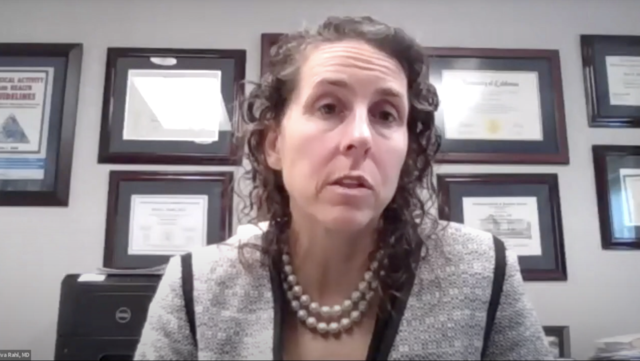
On December 5th, Asian Culture and Education Society USA invited Dr. Riva L. Rahl MD to give the Asian community a presentation entitled “Your Rx for a Healthy Life: the ABCs” for its 9th Public Health Series.
First, Dr. Rahl prescribed a set of recommendations for a healthy life using the ABCs. “A” was for “avoid tobacco” since tobacco is responsible for more death and medical problems in the United States today than any other substance.
“B” was for blood pressure. Because blood pressure affects so many organs, it is important to know and monitor one’s blood pressure. In the case of abnormal or unhealthy blood pressure, there are several measures that may be taken. One measure is exercise, which is an effective method to lower blood pressure by 6-10 points as soon as the activity is begun. Another measure is sodium intake since the blood pressure in approximately one out of three people is affected by the amount of sodium consumed. Therefore, to maintain healthy blood pressure, it is imperative to reduce daily salt intake and exercise regularly.

“C” was for cholesterol. Dr. Rahl discussed three kinds of cholesterol—high-density lipoprotein (HDL), low-density lipoprotein (LDL), and very-low-density lipoprotein (VLDL)—as well as triglycerides. Maintaining a healthy diet, performing aerobic activities, and controlling one’s body fat are all effective ways of increasing our good HDL and reducing bad LDL and triglycerides.
“D” was for diabetes, a disease that 14.1% of the US population possesses at present, making it a severe national health crisis. Like high blood pressure, blood sugar concentration affects many organs in our body. We learned about five traits that determine one’s risk for cardiovascular disease and diabetes: blood sugar, waist size, HDL, triglycerides, and blood pressure. If three out of five of these conditions are outside of their normal ranges, it will greatly increase one’s risk for cardiovascular disease and diabetes.
“E” was for exercise, which is Dr. Rahl’s favorite thing. According to the Physical Activity Guidelines for Americans, an adult should get at least 150 minutes of moderate-intensity physical activity (300 minutes is better) alongside 2 sessions of muscle-strengthening exercise every week, and kids should get at least 60 minutes of physical activity daily. There are three main objectives of exercise: to increase our oxygen intake through aerobic activity, to enhance our strength, and to improve our flexibility. The frequency, intensity, and duration of our exercise affect its quality. Thus, when we choose the styles of our exercises, we need to consider how it contributes toward these three components. Dr. Rahl emphasizes that exercise only lengthens our life by 1-2 years but may extend the period of our independent quality living by 8-14 years.
“F” was for fat, and it simply meant to avoid obesity. The more overweight one is the higher one’s risk of diabetes.
Dr. Rahl highlighted the health risks of regularly overindulging in alcoholic beverages. Alcohol is a double-edged sword: while an appropriate amount may help to reduce the risk of heart attack, stroke, and dementia, too much alcohol will increase blood triglycerides and cause major health issues such as cirrhosis and pancreatitis. Alcohol also significantly raises the risk for many kinds of cancer, including oral, colon, livers, esophageal, and breast cancers. According to one study, women who drink 3 servings of alcohol each week have a 25% higher risk to contract breast cancer compared to those without drinking alcohol.
Next, Dr. Rahl talked about stress. According to some sources, 85% of medical problems may be stress-related. Our mind and body exist as an integrated circuit, and our every thought stimulates a hormonal response. When our minds experience stress, our bodies release two hormones: adrenaline and cortisol.
Dr. Rahl also provided us with some tips to maintain health:
1) It is critical to eat breakfast and put fuel into our bodies in the morning, to get a solid lunch, and to keep healthy snacks on hand to maintain a stable blood sugar level throughout the day.
2) Deep breathing, making sure to move around every hour, stretching, and listening to music helps to manage our stress in small ways.
3) Begin with 10 minutes of exercise a day, and slowly increase duration and intensity. Dr. Rahl also suggested for us to diversify our exercises and perform “flight” and “fight” stimulating exercises. FLIGHT simulators such as walking, jogging, cycling, and swimming, as well as FIGHT simulators such as weightlifting, using resistance bands, and calisthenics can help us to burn off stress.
4) Balance the amount of love we give with the love we receive and live as if people were of the utmost importance.
5) Plan for vacations. Vacations can add as many as 8 years to our life.
6) Respect the power of sleep and get at least 7-9 hours of sleep a night. Regular exercise improves sleep quality.
The ACAES community deeply appreciated Dr. Rahl for her informative talk. In the midst of the global Covid-19 pandemic, she has given us tools to maintain our wellbeing and the integrity of our immune systems, which are of first priority for everyone. We will heed Dr. Rahl’s recommendations and make a concerted effort toward a healthier and happier life!
“It is easy to feel powerless in the face of COVID-19, but together we can make a difference! We will continue to help the community in need,” said Jan Xie, the president of Asian Culture and Education Society USA, “Please join and support the ACAESUSA”
www.acaesusa.org
Editor: ACAESUSA media team